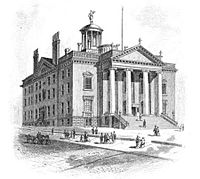52nd New York State Legislature
| 52nd New York State Legislature | |||||
|---|---|---|---|---|---|
|
|||||

The Old State Capitol (1879)
|
|||||
| Overview | |||||
| Jurisdiction | New York, United States | ||||
| Term | January 1 – December 31, 1829 | ||||
| Senate | |||||
| Members | 32 | ||||
| President | Lt. Gov. Enos T. Throop (J), until March 12 | ||||
| Temporary President | Charles Stebbins (J), from March 12 | ||||
| Party control | Jacksonian | ||||
| Assembly | |||||
| Members | 128 | ||||
| Speaker | Peter Robinson (J) | ||||
| Party control | Jacksonian | ||||
| Sessions | |||||
|
|||||
| 1st | January 6 – May 5, 1829 |
|---|
The 52nd New York State Legislature, consisting of the New York State Senate and the New York State Assembly, met from January 6 to May 5, 1829, during the short tenure of Martin Van Buren as Governor of New York, and—after Van Buren's resignation—during the first year of Enos T. Throop's governorship, in Albany.
Under the provisions of the New York Constitution of 1821, 32 Senators were elected on general tickets in eight senatorial districts for four-year terms. They were divided into four classes, and every year eight Senate seats came up for election. Assemblymen were elected countywide on general tickets to a one-year term, the whole Assembly being renewed annually.
On January 31, 1828, a caucus of Jacksonian legislators nominated Andrew Jackson for U.S. President.
State Senator Charles H. Carroll resigned in March 1828, leaving a vacancy in the Eighth District.
On June 10, 1828, a state convention of Adams men met at Albany, and nominated U.S. President John Quincy Adams for re-election.
On July 22, a state convention of Adams men met at Utica; James Fairlie was Chairman; and Tilly Lynde and Thomas Clowes were Secretaries. They nominated U.S. Supreme Court Justice Smith Thompson for governor, and Assemblyman Francis Granger for lieutenant governor.
The Anti-Masonic state convention nominated Assemblyman Francis Granger for governor, and State Senator John Crary for lieutenant governor. Granger declined to run for this office on this ticket, and expected Crary to decline too, so that he, Granger, could be endorsed by the Anti-Masons for lieutenant governor. Crary, however, did not decline and ran on the Anti-Masonic ticket with Solomon Southwick for governor.
...
Wikipedia
